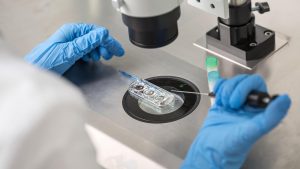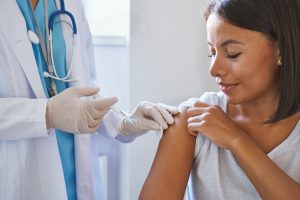Many times, clinics will focus on the health of the female when it comes to a successful IVF treatment. This isn’t to say that female health is not important when it comes to assisted reproductive technology, but often, the health of the male is overlooked. Obviously, the sperm will make up half the baby, so it’s essential that the health of the sperm is not ignored.
Seeking fertility treatment during a pandemic is upsetting enough, and the uncertainty that comes with it can add to the distress many patients feel, especially when the long-term effects of the virus have not been identified.
Sperm health is a topic that is brought up regularly, though, especially when it comes to both male patients and our donors. Our female patients are the ones who endure copious amounts of blood tests, needles, scans, and procedures, and it is therefore only natural that our male patients and sperm donors want to do everything and anything they can to ensure they are doing their part in the whole scenario.
Poor sperm health has been linked to recurrent miscarriages, reduced fertilisation and poor embryo development as well as long lasting impacts for the offspring, especially when DNA damage comes into it.
So, what can you do to ensure you have good sperm quality?
1. Nutrition
Nutrition is possibly the easiest and one of the most effective ways you can help improve your sperm quality, and this includes the count, the motility, and the morphology.
We have written previously about the importance of a healthy diet when undergoing fertility treatment and the significance of particular nutrients that can help boost your sperm concentration, as well as the way your sperm swims and what your sperm looks like.
2. Exposure
Exposure to chemicals such as pesticides and heavy metals can have a detrimental impact on sperm quality. The genetic integrity of sperm is essential for normal fertilisation and embryo development, and exposure to toxic chemicals can elevate the levels of DNA fragmentation in sperm, which have been linked to early pregnancy loss, poor embryo development and IVF outcomes, and also increases the chances of abnormalities in the offspring including an increased vulnerability to childhood cancer.

3. Lifestyle
It essential that when looking at sperm health, both long term and short term, to consider your lifestyle choices.
Studies have shown that smoking, vaping, recreational drug use, excessive alcohol consumption, and a poor diet can have adverse effects and can attribute to male infertility. Unhealthy lifestyles can decrease the success rate of assisted reproductive treatment, affecting the fertilisation rate and impeding healthy embryo development due to damaged DNA in the sperm.
One specific study presented at the 2018 ESHRE conference in Spain described the levels of toxic, mutagenic chemicals and carcinogens such as cotinine, cadmium, nicotine metabolites were found in patient seminal fluid at the same concentrations proportional to those in blood serum. This research has shown that the toxins are capable of crossing the blood-testis barrier, thereby affecting the germ cells, which are the cells that go on to form sperm cells.
There is also strong evidence in the study to show that the oxidative stress resulting from smoking can cause severe genetic and epigenetic changes which correlate directly to reduced sperm parameters and function.
If you’re looking for natural ways to keep your sperm healthy, we’ve identified 8 foods to help improve sperm quality.
4. Temperature
Although you might have millions, even a small rise in temperature can create errors within meiotic divisions and result in damaged sperm. Whether that be heat exposure from a laptop, heated car seats or if you have suffered from a fever, all these forms of heat exposure can have a detrimental impact on the quality of your sperm.
Sperm are the smallest cells in the human body and are incredibly sensitive to increased temperatures, unlike human eggs which are the largest cells in the human body and are formed internally where the temperature is consistent.
One of the questions we ask our male patients before they provide their semen sample is if they have been sick in the last 3 months. This is because even a slight temperature can impact healthy sperm cells and they take anywhere between two and a half to three months to regenerate.
Given the current situation with the COVID-19 pandemic, it is important to take extra precautions when it comes to sperm health. Men who suffer from cold and flu related fevers will find that their sperm quality will be impacted during this time and as one of the most common symptoms of COVID-19 is fever or increased temperature, it should come as no surprise that the quality of sperm will be affected.






